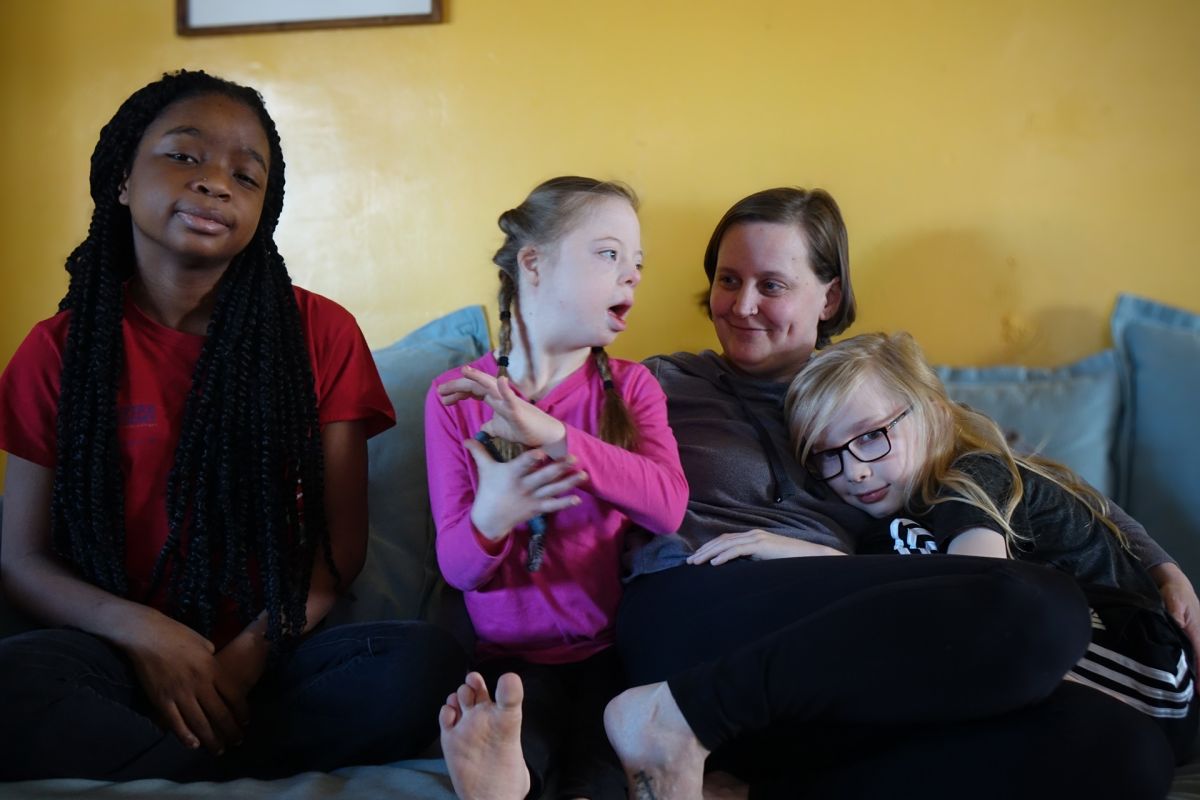Since the pandemic-era Medicaid withdrawal freeze ended this spring, millions of eligible beneficiaries across the country have lost their insurance for administrative reasons.
Incorrect documentation, glitches in the system, long wait times and outdated notices have led to people being taken off the rolls and leaving those caught in the process overwhelmed. For people with disabilities, the sudden loss of coverage can be devastating, with few options for redress.
As they struggle to get their insurance restored, some have been forced to cut back on vital home care hours and cut back on medications they rely on.
Andrea May and her family were among those left feeling scared and frustrated after being dropped off.
As a single mother of three, all of whom have serious, life-changing health issues, sleep has become a luxury for May these days.
“Well, sleep is a funny thing,” said May. “You sleep when you can.”
Mae lives in Muncie, Indiana. Their youngest daughter, Shiloh, 12, has epilepsy, hypothyroidism, Down syndrome and hearing loss. Shiloh also relies on a wheelchair and a gastrostomy tube to get fluids and fluids. Because of her disability, Shiloh is on the Medicaid program for the elderly and disabled, which pays for a caregiver to help her with basic daily activities.
“I get paid to be her carer because of her care exemption,” May said, “so I get paid just to look after her while she’s with me, which is really great, especially since COVID hit and care staff numbers are close to zero and it’s been nearly impossible to get someone else to look after her.”
May, 41, went back to college to get a degree in special education, and Medicaid benefits provide most of her income and cover living expenses and food costs.
That is until the wholesale dismantling of Medicaid.

States have been combing their Medicaid enrollment rolls to remove people who have lost eligibility since the federal COVID-19 public health emergency ended in April 2023. Most of the 330,413 people removed from Medicaid so far in Indiana did so for procedural reasons, according to an analysis by health policy nonprofit KFF, meaning many may still be eligible.
Without Medicaid, Mae had to choose which medications to give Shiloh. She decided to give him the ones he needed to keep him from dying, for his seizures and hormone deficiencies.
“My daughter has pretty severe ADHD. She’s very impulsive. She wasn’t taking any ADHD medication,” May said. “She was going to school without any medication. School was difficult. And I thought, ‘She can’t learn. I understand that. I’m sorry. I don’t know what else to do.'”
Shilo was extremely impulsive and dangerous at home. May couldn’t cook or shower while he was awake. And with no medical care, May blew through her savings. She had to pay more than $400 out of pocket every two weeks for Shilo’s medication.
They did everything right but ended up losing their insurance.
But why did May’s family lose their insurance? May spent weeks trying to figure it out.

First, her youngest son, Asher, lost his insurance in May. Indiana’s Department of Family and Social Services, which oversees Medicaid, told May it had sent her a letter informing her that her documents had been lost. But May never saw the letter. She went to her local office in person and turned in all her paperwork: pay stubs, proof of income, child support payments.
“And within a few weeks, my son was reinstated in his Medicaid eligibility,” she said.
Mae felt she had done everything right, but a few months later, she and her two daughters, Shiloh and Mae, were taken off Medicaid.
May made multiple visits to the office and broke down in tears on the phone, saying caseworkers were kind and tried to help but couldn’t resolve her issues.
“They were like, ‘Yes, we’re checking it in the system, it’s just waiting on the computer.’ [it] “Something has to be done before they can override it and reinstate the insurance,” she said.
It took more than a month for the family’s Medicaid to be reinstated.
In response to questions in December, the FSSA said it had not experienced any computer system-related issues. A spokesman said it couldn’t comment on specific recipient cases without authorization, adding that the Family Resource Division, which reviews eligibility for assistance programs including Medicaid, was investing in increased staffing and training in preparation for the elimination.
“The Family Resource Division has prepared for the dissolution process by adding 300 staff to assist with the Medicaid eligibility re-determination process,” said FSSA spokesperson Michelle Holtkamp. “Their training included all aspects of Medicaid with an emphasis on the re-determination process.”
However, Medicaid navigators, patient advocates, and people with disabilities reported encountering caseworkers who had limited knowledge about specific Medicaid programs and provided incomplete or incorrect information.
“No matter when I call, I never get a good answer,” said Jordan Dickey, an Indiana man who was enrolled in the disability Medicaid program.
He received a letter from the Social Security Administration over the summer saying he was no longer considered disabled and therefore no longer eligible for Medicaid.
But he has distal spinal muscular atrophy, which means he is wheelchair-bound and his disability will be lifelong.
He uses a Medicaid waiver to pay for an aide to help him with basics like using the bathroom and getting dressed. Since Medicaid was cut off, he has been paying out of pocket and reducing the number of hours he receives assistance.
A month has passed.
“When I call [the state Medicaid office] They’re like, ‘Oh, I’ve never heard of that program before,'” Dickey said.
He recalled an hour-and-a-half phone call with his caseworker asking about the letter. “And [the caseworker] “They kept saying, ‘Oh, I wish my boss was here.’ And I was like, ‘That’s not helpful.’
Even lawyers couldn’t escape
Emily Munson has spinal muscular atrophy, which qualifies her for a Medicaid waiver and a program called MEDWorks, which allows her to continue receiving services while working and paying a monthly premium.
Munson is an attorney for the Indiana Disability Rights Association, a federally funded organization that helps people with disabilities, so she knows the system very well. But she’s no exception.
Over the summer, she received notice from the state that her Medicaid would soon be terminated because she was making too much, but she later learned the state had miscalculated her income.
“For some reason they claimed my sister’s bank account was part of my money and assumed we were the same household, but Medworks doesn’t calculate it that way. I’m an individual, not a household,” she said.
Manson appealed within the time limit and a hearing was scheduled.
But before the hearing, she discovered her insurance had been discontinued when she went to pick up her medication at the pharmacy, and what once was free now costs $70 for three pills.
Medicaid navigators and patient advocates say they frequently encounter people like Munson who lose their insurance despite their best efforts.
“We’ve heard stories of people who are using the online portal, and they’re actually going to the office, faxing their paperwork, and they’re collecting all their paperwork there, so there’s no procedural deregistration happening, and their paperwork isn’t even properly attached to their case,” said Natasha Crespo, an attorney with the Indiana Disability Rights Coalition.
Crespo worries most about people with little knowledge or expertise to navigate the system, many of whom she says don’t appeal state decisions.
“They just believe what they’re told in the letter: ‘My insurance has been terminated. It’s past due. I don’t know what to do,'” she says.
Crespo recommends contacting a Medicaid navigator or an organization like hers as soon as possible if your insurance is terminated to appeal.
Resources for Indiana Medicaid recipients:
Side Effects Public Media is a health reporting collective based at WFYI in Indianapolis. We partner with NPR stations across the Midwest and surrounding areas, including KBIA and KCUR in Missouri, Iowa Public Radio, Ideastream in Ohio, and WFPL in Kentucky.

